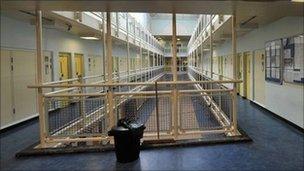School exclusion leads to jail, says prisons inspector
- Published

The annual report also highlights the role of family in influencing young people
The chief inspector of prisons has said fewer young people would end up in prison if schools ended their policy of exclusion.
In his annual report on Scotland's prisons, Brig Hugh Munro has drawn attention to the country's culture of violence.
This, he said, is often combined with the "scourge of religious bigotry".
In its response to the report, the Scottish government said crime was at its lowest level for 35 years.
Brig Munro said that Scotland's "offending landscape" remained a challenge for the prison system.
In the report he writes: "Parts of Scotland encourage a culture of violence, a culture that also suffers from the added scourge of religious bigotry.
"It is this culture that I have seen going round prisons and most obviously when I inspected Addiewell in 2010, where I found that levels of violence are high."
'Responsible citizens'
The annual report also highlights the role of family in influencing young people.
Young offenders are reported to have said that family and relations have not only encouraged retaliation in incidents of conflict but demanded it.
To do otherwise, according to the report, would encourage bullying, something that would bring shame and weakness to the family.
Many young offenders are said to have been excluded from school, and often "hardly attended" school from the ages of 13 or 14 onwards.
It is during the period of exclusion, according to Brig Munro, that young people get involved with alcohol, violence and possibly early experimentation with drugs.
He added: "Young people from areas of risk must be... delivered into society on leaving school as responsible citizens equipped to play to their strengths and not be subject to the demons of violence, domestic abuse, religious bigotry, drink and drugs.
"This will not happen overnight, but cultures and behaviours need to be changed and improved with a fully integrated and coordinated strategy across Scotland.
"To do otherwise will invite yet another generation of young people into Polmont and Cornton Vale. What a waste that would be."
The Scottish government has welcomed what it called the "broadly positive tone" of the report.
Justice Minister Kenny MacAskill said: "Instead of giving free bed and board to less serious offenders, prison should be used to keep dangerous criminals off our streets for longer.
"More needs to be done to tackle the rising prison population, much of which is driven by the large number of low level offenders being given short custodial sentences."
- Published28 September 2011
- Published19 August 2011
- Published15 March 2011